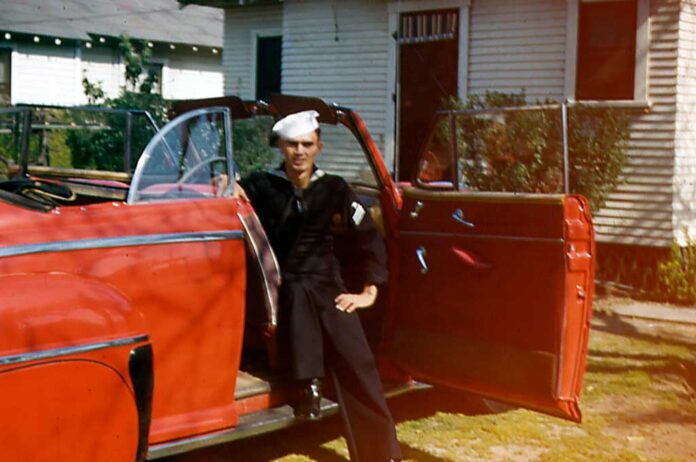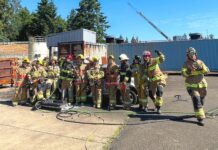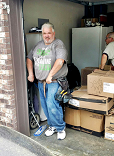While under constant pressure of danger from Communist Chinese soldiers, Tualatin resident Joe Lipscomb served with the Marine Corps in front lines of the Korean Demilitarized Zone (DMZ). He and his fellow Marines went to sleep every night with concern for their personal safety, always on alert for the enemy crossing the border with intentions to annihilate their unit. Joe lived under those conditions for 22 months on the DMZ.
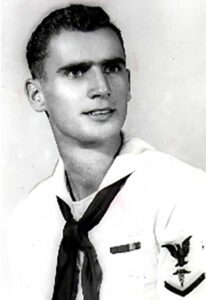
Joe was the second speaker at the Juanita Pohl Center 2013 Veteran’s Day Korean War recognition breakfast, following Wayne Sparks who was survivor of the Battle of Chosin Reservoir. Joe enlisted in the Navy in 1951 and after boot camp, completed Corpsman School in San Diego, California. (A corpsman is the same as a medic) He was first stationed at Naval Hospital San Diego then the San Diego Navy Training Center where he met his wife to-be (a student at San Diego State). In 1953 he transferred to the Fleet Marine Force. The Marine Corps utilize Navy personnel to serve in a number of critical specialties. That meant that Joe changed uniforms from Navy blues to Marine Corps greens). At Marine Base Pendleton, he went through Marine combat training school ‘Marine Boot Camp’, which included weapons training. After discharged, he married his wife who by then was a teacher. Returning to college, he graduated in Architecture from Cal Poly San Luis Obispo, and went on to a successful career in that field.
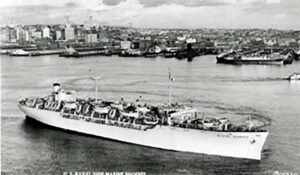
Joe was sent to Korea on replacement draft June 1953, attached to H Company, 3rd Battalion, 1st Marine Regiment, 1st Marine Division. Serving on the Western portion of the DMZ line, his unit was stationed north of Munsan-ni and above the Imjin River, in an area known as ‘Nevada Cities’ a no man’s land north of the Imjin Bridge region. When the Armistice Agreement was signed, beginning the cease fire to the war, the Chinese Division and the Marines subsequently withdrew 2 kilometers (1.2 mi) within 72 hours to create a 4-kilometer (2.5 mi) demilitarized zone (DMZ). Panmunjom, the area where truce talks continue to be held, was located on the left of his unit and the Commonwealth Division’s Queens Own Rifles of Canada were located to the right of his unit. He had his 21st birthday on the front line – not the place he expected to celebrate it.
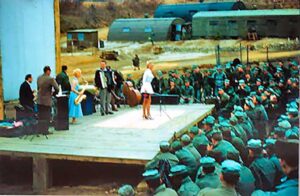
Joe and his fellow Marines were always on guard because they never knew what was going to happen and there was nowhere else to go. If the Chinese came across the DMZ in numbers like at Chosin Reservoir, American life expectancy would be very short. Their orders were to hold the line until re-enforcements arrived. If overrun, they were to reposition and hold that line, again until arrival of re-enforcements. Also, there was constant danger of having to deal with infiltrators, trying to sneak through. Joe said he and his fellow Marines dealt with it by developing regular daily routines. With binoculars, they viewed soldiers on the other side. They nicknamed two with significant differences in height, Mutt and Jeff. One pleasant diversion starting in 1954 involved sending dirty laundry on morning ambulance runs to regimental aid. The laundry was dropped off on the south side of Imjin Bridge with a carton of cigarettes. In the afternoon, local ladies would have the clean laundry waiting by the side of the road for pickup. Cigarettes were valuable bartering items for the Koreans. Joe had his only break from Korea with a two week R&R in Kyoto, Japan in 1954.
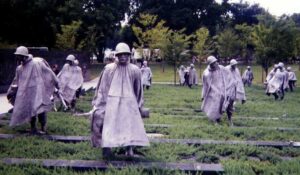
After promotion to E-5, Joe moved to Battalion Aid, located at 3rd Battalion HQ on DMZ. Battalion Aid included a doctor, providing a second level of medical assistance beyond corpsmen on the front lines. Those needing more medical help were sent to Regimental Aid which had facilities similar to a MASH portrayed in the TV series. For more specialized treatment, patients were sent to hospital ships off the coast or to hospitals in Japan. There were a few more amenities at Battalion Aid Headquarters. The doctor and Navy Chaplain there had scrounged up materials to set up a hot shower facility on ‘Navy Hill’.
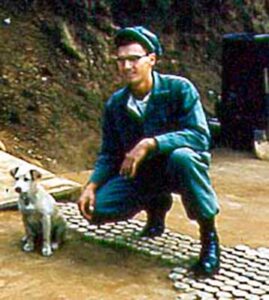
It is important to remember that the war in Korea has never been declared over. North Korea is a dangerous nation, and getting scarier with current demigod ruler, Kim Jong-un Sun. Not only is North Korea a serious threat to South Korea, it is a major concern for both its allies and the entire free world.

